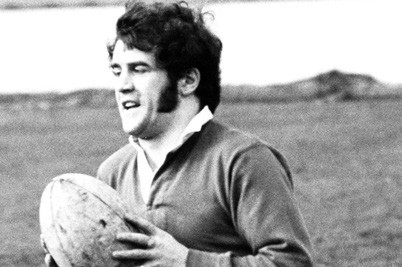Dai Watkins, a magnet for every hit-man in north

EJXXMP
David Watkins used to be fond of telling two anecdotes from his bruising initiation into Rugby League. Typically, each tale would be told not as an exercise in self-aggrandisement but in self-deprecation.
After a winning home debut for Salford, the next fixture exposed the coalminer’s son to Workington Town where the heavy mob took it in turn to run him over. As their victim picked himself up from the third painful experience, a spectator shouted out at the top of his voice: “Hey, Watkins. Next time, try hitting ‘em with your wallet.”
His status in October 1967 as the most expensive Union convert to League in a deal worth £16,000 – more than £300,000 by today’s values – made him a magnet for every hit-man in the north of England aggrieved to learn that a Welsh ‘midget’ was being paid so much when they were getting so little.
Watkins knew, of course, that such a fortune would come at a price, most probably in the shape of a stiffarm tackle. It arrived all too soon, whereupon the assailant made no attempt to disguise the motivation behind the brutality. “Now, then,” he said, standing over his flattened victim. “Twinkle, twinkle little star, if you ******* can.”
Watkins, right, never lost the twinkle for long, no matter how strong the anaesthetising effects of the blow and yet he would usually manage to have the last laugh. A mind as sharp off the field as on it would invariably find a riposte to end any argument. “Whenever I am asked about the vigorous treatment a League player can receive,” he wrote in an autobiography, “my standard reply is that I took so many hard knocks in Union for fun, it’s dead easy to take them for money.”
Other knocks, all too redolent of Union’s haughty attitude towards those who went north as ‘aliens’ and ‘undesirables’ in Watkins’ words, hurt him far more. Two embarrassing episodes caused by Cardiff RFC hurt him most of all.
They banned him from a pre-arranged BBC interview at the Arms Park in 1977 and again a few months later from the press box, presumably on the insulting basis that their premises would be irrevocably tainted. By contrast, Watkins always treasured the fact that his beloved Newport never saw reason to rescind his membership at Rodney Parade.
His League days done, he returned there in the early Nineties serving the club as manager and chairman during the period pre-regionalisation 20 years ago. A Test Lion in Union (New Zealand 1966) and again with the GB League Lions (Australia 1973), Watkins played more than 700 matches in both codes.
His death last Sunday at the age of 81 came five weeks after that of Clive Rowlands, his half-back partner during the 1963 Five Nations when they followed a home failure against England by winning at Murrayfield in a match notorious for its 111 lineouts.
When Rowlands was told he required a quadruple heart by-pass operation, he joked: “Quadruple is four so that’s two more passes than I gave Dai Watkins up in Scotland…”
Dai’s admiration for ‘Top Cat’s’ tactical approach never allowed the slightest room for complaint. “Apart from my two passes, I collected two drop-outs and those were put into touch along with everything else.
“It was suggested in the dressing-room afterwards that the WRU might have supplied me with a pair of woolen gloves but I’m not complaining.”
From the dizzy early days of helping Newport beat Sir Wilson Whineray’s mighty All Blacks in the autumn of 1963 right the way through, he was always the same: ever helpful, ever courteous, every ready to find time for anyone and everyone.